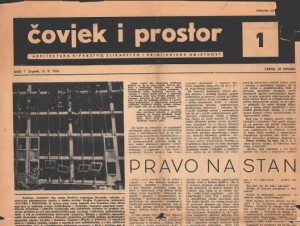Housing – From Right to Financialisation (and Back)
DUBRAVKA SEKULIĆ
Saturday, 14th September 2013, 19:00 – lecture
Sunday, 15th September 2013, 12:00 – workshop
Premises of the League of the Anti-fascist Fighters and Antifascists of Croatia, Pavla Hatza 16, Zagreb
Tent settlements inhabited by the homeless, which began appearing in American cities after the financial bubble burst in 2008, are one of the most enduring images of the crisis in the (Western) world today, as evidenced by Occupy Wall Street. In Spain, where the finished yet never sold and inhabited ghost houses are counted in the millions, people get organised and fight the police every day to prevent the eviction of those incapable of repaying their loans and losing the roofs over their heads for that very reason. The Association Franak’s recent victory in the dispute with banks reminds us that the housing crisis, which is evident around the world, is not someone else’s problem, but that it is also an issue present in our everyday lives. The American dream of owning a (suburban) house which had spread around the world in the 1950’s, has long since turned into a nightmare. The quality and quantity of housing are now controlled by the available amount of payment.
The lecture entitled Housing – From Right to Finalisation (And Back) will go back to the 19th century, when the idea of “the right to housing” was born in the heart of industrialisation and will follow the idea’s development, as well as the political and spatial forms which have developed in the societies which have accepted the right to accessible and dignified housing as the basis for the development of a society with a greater level of equality: Otto Neurath’s work at the time of Red Vienna, and “the right to housing” in Yugoslavia and Sweden. Furthermore, it will provide the analysis of the gradual withdrawal from the above idea in the mid-1980’s and the handing of housing not only over to the market, but also to financial machinations. The problems of “illegal construction” and “legalisation” will also be analysed within the context of “the right to housing”. The idea behind the lecture is to remind us of the decades spent fighting for the right to housing and the careless abandonment of this idea, and to point out the consequences of such a process, as well as posing the question of a new “right to housing” as a potential field for the emancipatory struggle towards a society with a greater level of equality. Special attention will be paid to the position of architecture as a practice involved in the direct translation of housing ideas into space and actual projects.
The next day, at the workshop partly held in Novi Zagreb, the Yugoslav politics of “the right to housing” will be given an in-depth analysis: what kind of city was it building in comparison with the city built solely by the market?
Dubravka Sekulić is invested in the ideas of transforming the public space in modern cities, public goods and spatial justice, as well as the spatial consequences of neoliberal planning. She graduated from the University of Belgrade Faculty of Architecture, where she was also a teaching associate. She was a fellow of the Akademie Schloss Solitude in Stuttgart, as part of the Eastern European exchange program, and a researcher at the Department of Design at the Jan van Eyck Academie in Maastricht. She is a PhD student at the Department of History and Theory of Architecture at the Swiss Federal Institute of Technology Zurich (ETH). Of her recent projects, we should point out the 2012 exhibition at the Museum of Contemporary Art in Belgrade, entitled Three Points of Support: Zoran Bojović, which deals with the link between Yugoslav modernism and the non-aligned countries through focusing on Zoran Bojović and Energoprojekt’s projects in Africa and the Middle East, and the 2011 exhibition and book entitled The Struggle for Everyday Life. The Example of Peti Park, about a community’s struggle for a park in Belgrade. The Jan van Eyck Academie published her two books in 2012: Glotzt Nicht so Romantisch! On Extralegal Space in Belgrade, and Surfing the Black, about the Yugoslav black wave cinema, written in co-operation with Žiga Testen and Gal Kirn. She is currently working on a book with the working title Planning for the Unexpected – A Sourcebook for the Urban Struggle which is based on the experiences of the regional initiatives for the right to the city, for which she won a scholarship at the Royal Institute of Art in Stockholm.
The lecture and workshop are held as a collaboration between the programs Micropolitics and Urbanistička početnica (The Urban Primer).
The Urban Primer is an educational and informative partnership dealing with the basic questions of urbanity, the perception and articulation of space, architecture, urbanism, design and art in the public space and the ways the above are shaped, used and planned under the influence of economic pressure and the changes conditioned by the accelerated building up and exploitation of the natural and urban environment.
